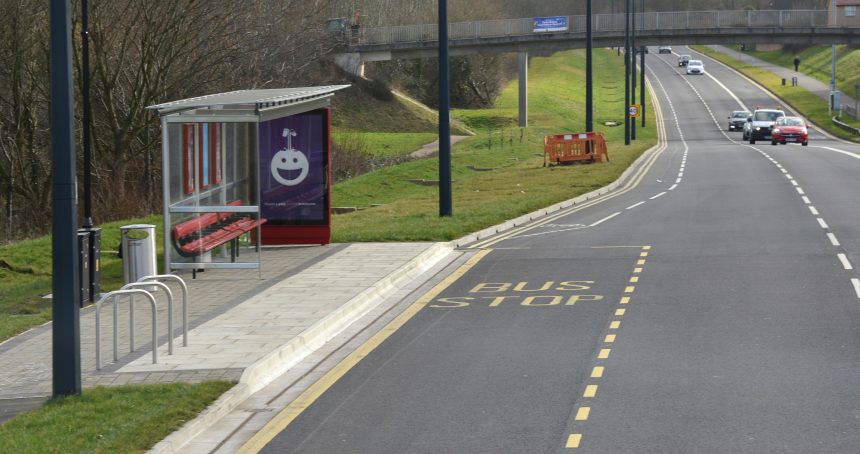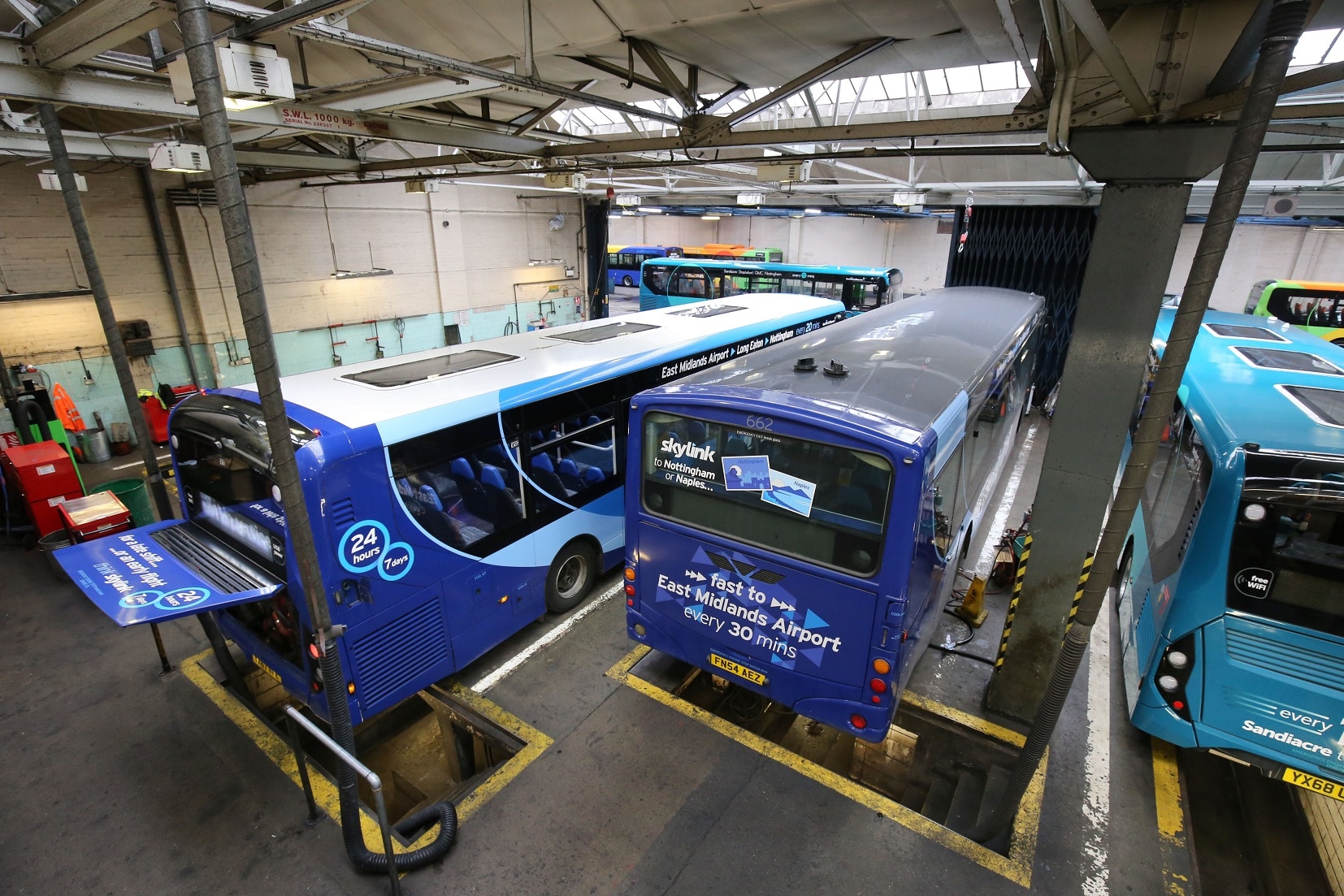The £230m Bristol Metrobus project is due to open in stages later this year. Ahead of its official launch we take an exclusive preview of the three-route network
Bristol is a city that’s on the up and shortly it will have a transport network that befits it.
Due to open later this year, the finishing touches are currently being put to the Metrobus BRT network. And, it’s much more than a few bus lanes and shelters.
A joint project between Bristol City, North Somerset and South Gloucestershire Councils, the scheme also includes regeneration of the city centre’s streetscape and, to use the jargon, place making.
Due to its geography, road links have traditionally been poor, while the suburban rail network has always been limited.
The 51km Metrobus network will change all that; and also help other traffic flow more freely too. To win public and political support, the scheme has been designed to improve the entire road-based network.
Critics, of which there have been plenty, quickly argue that Bristol should have a tram network, but that ignores the costs – £2.3bn compared with £230m for Metrobus.
In short, Metrobus delivers 90% of the benefits of a tram system, for 10% of the cost, yet is also a fully-integrated transport system. It’s not a cure for all Bristol’s transport needs, but it’s an important start.
And this is important when you consider that Bristol is vital to the country’s economy, being the only net contributor to GDP in the UK, outside London and the south east.
The Bristol Metrobus scheme in detail
Initially three routes will connect outlying areas with the centre. Plans for two more are in progress.
It is a vast scheme, and Bristol’s residents have endured almost two years of disruption as the roadworks have taken place. The idea is to create high levels of bus priority, with a mix of bus lanes, bus priority at pinch-points, and a host of new junctions that smooth all traffic flow.
Rather than take space from motorists, where possible road widening has been used to create bus lanes. This is important as by 2036 an additional 106,000 homes are to be built, with much of the development on the north side of Bristol, near the M4 corridor.
Much of the work also reflects that fact the Bristol’s road network was developed in the 1960s (with the arrival of the M32 into the city centre), and since then few junctions or structures have been updated.
A total of eight bridges have been rebuilt – some to meet modern standards and traffic flows, while a 1.6km new link road has been built as well. This is open for all traffic and provides relief to the existing network.
Operations: More to be revealed in due course
A launch with more information – including details of the Bristol Metrobus operators – is expected next month. So far, only First has been revealed as the operator of the M2 route, on a commercial basis.
Like other similar schemes (such as the Cambridgeshire Busway), access and operation of the Metrobus project is governed by a Voluntary Quality Partnership Scheme. One of the challenges of following the scheme’s progress is that you really need to see it to appreciate not only the scale of what has been achieved, but also the transformation taking place.
In a preview by industry professionals organised by The Chartered Institute of Logistics and Transport (CILT), and kindly hosted by South Gloucestershire Council, we were able to see the work first-hand. First Bristol kindly provided one of its fleet of yet-to-be-launched gas buses for the guests.
As befits a BRT scheme, all buses will be two-door to reduce dwell times, with a target of 20 seconds per stop. Off-bus ticketing will be provided using iPoints (taking cards only). For those who do not have debit/credit cards, arrangements for cash tickets will be made with shops, similar to the PayPoint/PayZone model. There is already a smartcard system, and iPoint will also dispense these.
The 79 stops on the three routes are all high quality, with electronic information, cycle racks and modern access standards. In some cases, laybys are not used, to ensure that buses are not delayed by motorists refusing to let buses pull out.
The key of the system is its reliability, followed by frequency and quality. Every possible method to increase reliability has been used, from smart traffic lights, to modern junction arrangements and a major overhaul of the central Bristol road network.
One spin-off has been the creation of new open spaces in the city centre, that are pedestrian-friendly, replacing much of the ‘car first’ 1960s layout.
Bristol Metrobus ‘is designed for the future’
The expectation is that initially 20,000 passengers a day will use the network, but Metrobus has been designed for the future, especially with new housing development in mind.
It might sound trite that the scheme is designed to link housing and employment – but that really is the case, with many jobs being in the north of the region, and housing in the south.
Already, the work that has been completed has led to an improvement in performance. First has just changed 60 timetables to take out running time now congestion has eased, while it has also seen an improvement in reliability.
An obvious question is why Bristol Parkway, a major station, is not yet on the route. Built ‘on the cheap’ in the 1970s, its road layout needs significant work to accommodate Metrobus, so this will be a later development. Already, buses using the site are very tightly constrained.
The M32 is a key artery into the city and it now has a bus-only inbound lane. To accommodate this, the existing two lanes were narrowed to provide the third offside bus lane, with a strictly-enforced 40mph speed limit. Outbound, there are not normally congestion issues.
In a unique move, working with Highways England, the UK’s first bus-only junction has been created onto and off the M32 – again, camera-enforced – to enable easy access.
Worth the short-term pain for the long-term gain
Metrobus has been a long time coming: It was 2006 that the scheme was outlined, and since then there have been political changes and numerous wrangles. However, it seems likely from our view of the yet-to-be-completed network, that it will be a model that others will want to emulate.
While tram networks are seen as the ‘thing to have’, they are also very expensive and require very large volumes of people to make them viable.
Metrobus will create a new mode of transport and, hopefully, a new way of thinking. We already know that people who use park-and-ride routes around the country consider themselves as doing that, rather than being bus users. It seems likely that Metrobus users will also be in a league of their own.


























